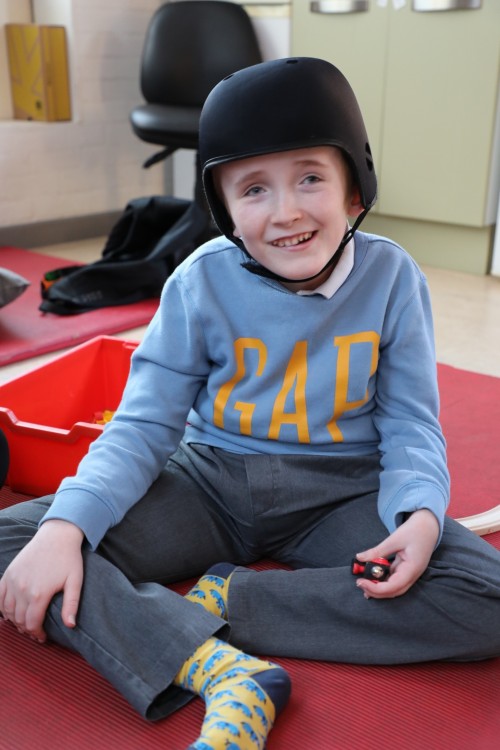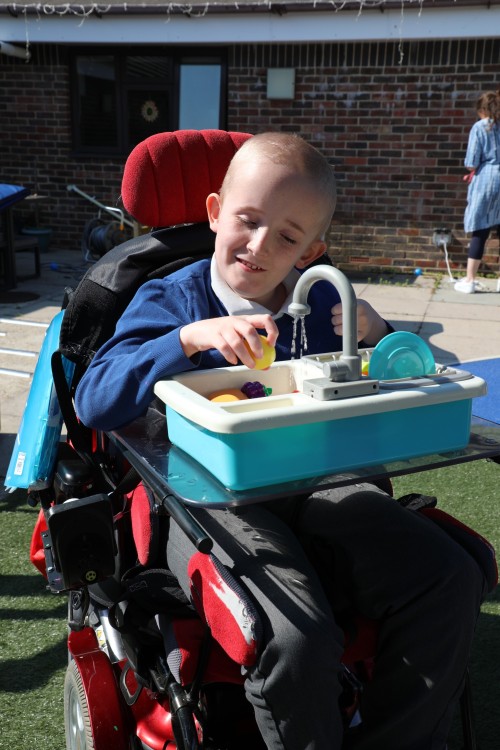Henry
Henry, who is now 12 years old, has been coming to school at Chailey Heritage Foundation for nine years and living here full time in Brambles Bungalow for the last two years. He has just moved to a bigger bedroom so that he has more space to move around in his wheelchair and his family have decorated the walls in his new room with spaceships, planets, vehicles, and colourful photo canvas prints of his family. Henry loves to point at the pictures, saying the names of his family aloud. Toys are stacked in the corner, including the click cars that Henry is absolutely obsessed with.
His Mum, Caroline, and Support Worker, Hannah, tell how easily Henry settled into living full time in Brambles Bungalow, and how reassuring it is when a child adapts to living away from home full time. Henry certainly looks happy and is incredibly smiley and engaging, but that can sometimes mask the severity of his disabilities which include Multicystic Hydrocephalus, Cerebral Palsy, Epilepsy, Autism, and a visual impairment.
Caroline explains that when Henry was born, he had to undergo many operations and brain surgery. She explains that life felt like a complete whirlwind, with appointments every day, adapting the house to accommodate Henry’s many complex health needs, knowing that he wasn’t meeting his milestones, and dealing with him crying and becoming anxious when going out socially. She describes how Henry would be content if he was moving and being pushed in his wheelchair, but if she stopped, he would immediately become upset, shouting, or screaming. “It became harder and harder to go out with Henry, so we became socially isolated, because it was easier not to face the consequences of even trying.”
It is a cruel and often unspoken reality of disability, that when families need support the most, they often face isolation because managing the emotional and physical needs of disabled individuals in public can be so difficult. This means that disability becomes more remote in society, and sadly those families who need support the most can often become hidden too.
However, becoming homebound didn’t work for the family either, as Henry is a boy who loves to be active, independent and move around freely. “The house didn’t have enough room for Henry to drive his wheelchair, I was constantly on guard in case he bumped into walls, the dog, or his baby brother Theodore! It was also difficult because every time I tried to be with Theodore, Henry would get so upset.”
The difference now that Henry is living full time in Brambles Bungalow with support from a devoted team is amazing – he has room to move his wheelchair around the airy, spacious accommodation, he can access a range of engaging activities every day, and he has made some great friends including Ellis and Coco. His family enjoy quality time with him when they visit, unconstrained by the significant emotional and physical challenges they faced daily when he lived at home.
Caroline has noticed a huge improvement in his wellbeing now that he has structure to his days with everything accessible on one-site, as routine is extremely important for Henry - changes can make him anxious and irritable. She explains that now when she walks him out in his wheelchair and stops, he is calm and able to cope. He loves to swim in the hydrotherapy pool, horse ride in hippotherapy classes, and drive his powered chair around the site and school. His vocalisations have improved too - he is now uttering two syllable words and is able to articulate the names of his whole support team.
Promoting independence and choice is an ambition Chailey Heritage Foundation has for every young person and appeals to Henry’s personality, being such an independent person. Each day Henry gets to choose what he wears, what he eats for breakfast, activities for that day, and the games he wants to play. His Mum loves the fact that he has so much variety in his diet and has seen his appetite increase since living here full time.
Hanah explains that with a lot of support and encouragement from his support team, Henry is making great progress, and his confidence is increasing too. Initially he wasn’t keen to visit Patchwork Farm, the on-site therapeutic care farm, so staff brought the animals to the classroom instead. But with time, Henry has found the courage to visit the farm and enjoys driving his wheelchair around the pathways and particularly loves visiting the pigs! He loves being outdoors, so the farm is a wonderful chance for him to connect with nature and animals.
Although he is still not keen on being in large groups, Henry is happy to try new situations and has started attending sessions in the Dream Centre, which is an immersive, interactive, creative space. Occasionally his team cut sessions short if he becomes upset, but it is the fact he is attempting new situations and experiences that is helping his confidence to grow and his support team patiently encourage him throughout. Hannah cites the fact that his family are comfortable to go on holiday without him as a huge achievement for his support team, because she feels that they have won the family’s trust, knowing that Henry is in safe hands and receiving the best support and care.
Caroline echoes this, saying that seeing Henry so happy and safe has given her family the confidence to start doing the ‘normal’ things other families enjoy and have a social life again. “Now we are living life again, whereas before we were just existing. It felt like we were living on eggshells the whole time, but now we have time to breathe, we have a social life, and seeing Henry so settled and happy means we can enjoy spending time with him too. All the staff at Chailey Heritage are amazing and we feel so blessed that he’s able to be there and live his life to the full too.”







